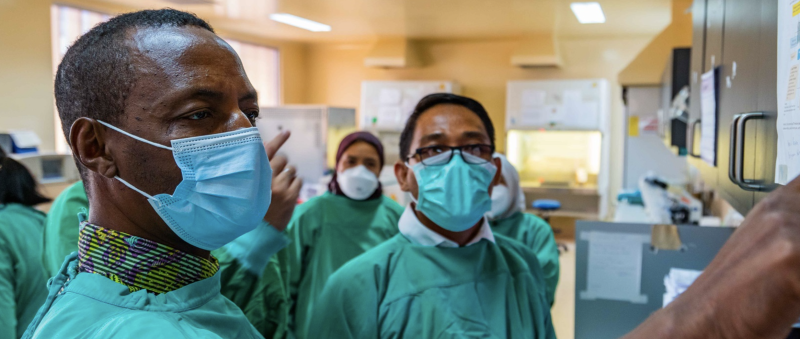
Infection prevention and control: Indonesia’s bold advances
South-East Asia Region
Indonesia
An assessment of infection prevention and control (IPC) in Indonesian hospitals from 18 November to 11 December 2024 confirms the country's significant progress in strengthening patient safety and quality of care. The evaluation, led by the Ministry of Health’s (MoH) Directorate of Health Service Quality, with support from the World Health Organization (WHO), found that 80% of assessed hospitals achieved advanced performance in at least five of the eight core IPC components.
IPC is a practical, evidence-based approach to protecting patients and health workers from avoidable infections. These infections can result in extended hospital stays, long-standing disability, increased antimicrobial resistance, additional financial burden on patients, families and health systems, and avoidable deaths.
Globally, out of every 100 patients in acute-care hospitals, seven patients in high-income countries and 15 patients in low- and middle-income countries will acquire at least one health care-associated infection (HAI) during their hospital stay. On average, 1 in every 10 affected patients will die from their HAI.
In Indonesia, improving patient safety – including IPC – is a core priority, reflected in the country’s Health Transformation Agenda, Medium-Term National Development Plan (RPJMN) 2025–2029 and overall quest to achieve universal health coverage (UHC). IPC implementation is regulated by Minister of Health Regulation No. 27 of 2017, which establishes core standards for IPC practices in hospitals and other health care facilities. Nation-wide, IPC is a key component of hospital accreditation.
The MoH and WHO evaluation was based on the WHO Infection Prevention and Control Assessment Framework. It found that eight of the 10 hospitals scored “Advanced,” while two fell into the “Intermediate” category due to specific gaps in surveillance, antimicrobial stewardship and leadership support. No hospitals were classified as “Basic” or “Inadequate,” signaling overall positive progress.
However, hospitals in urban centres and those under private or military management demonstrated stronger IPC performance, benefiting from better funding and stronger institutional commitment. Rural hospitals, particularly in disadvantaged, border and remote areas, were found to face significant challenges due to limited resources and trained personnel.
“Indonesia has made great strides in infection prevention, but hospitals need more support, especially public hospitals,” said Dr Irna Lidiawati, MARS, Chairperson of the Healthcare Quality Improvement Team for Hospitals and Primary Care Units, MoH. “Strengthening surveillance and improving access to microbiology services will be key priorities,” she said, stressing the need for ongoing investment.
The monitoring and evaluation initiative included self-assessments, site visits and interviews with hospital leadership and frontline staff. A key recommendation is to expand surveillance of HAIs and ensure that all hospitals, especially public hospitals, have access to microbiology services.
The report also calls for increased IPC training, enhanced leadership engagement and stronger integration of IPC compliance into hospital accreditation processes. This will boost overall hospital performance and reinforce Indonesia’s commitment to global health security.
“Infection prevention and control is essential for resilient health systems, and is at the heart of patient safety,” said Prof. Roderick Salenga, WHO Indonesia Team Lead for Health Systems. “Indonesia’s progress is commendable, but continued efforts are needed so that every hospital, regardless of location, can implement effective IPC measures, for optimal patient outcomes. WHO remains committed to supporting Indonesia in this endeavour.”
The assessment marks a significant step forward in strengthening IPC in Indonesia. The next phase – finalizing reports and integrating findings into national IPC policies – will build on this momentum, ensuring safer health care environments for all.